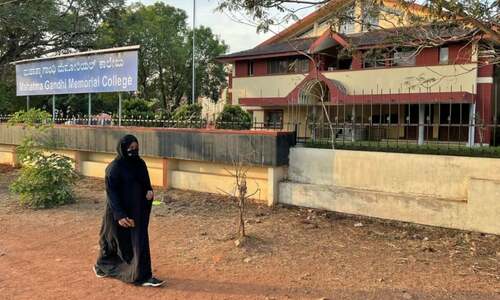Senior schools reopened in the Indian state of Karnataka on Wednesday a week after authorities closed them in the face of protests against a ban on female students wearing the hijab.
A court is deliberating the recent ban on schoolgirls wearing the hijab imposed by Karnataka authorities, the latest issue of contention involving India's Muslim minority, who make up about 13 per cent of the Hindu-majority country's 1.3 billion people.
Students wearing olive-green uniforms, some in the hijab, walked hand-in-hand on Wednesday into the Government Girls Senior School P. U. in Udupi district, where the protests started this month. Male and female police stood guard.
All of the students were allowed, including the girls in hijabs, despite a ruling from the state's High Court last week that schools should bar any religious clothing in classrooms until further instructions. The court will hear further arguments on Wednesday.

Senior district official Kurma Rao M said talks were underway in the community on the court ruling.
“We have held a meeting with all religious leaders, various stakeholders on the implementation of the court's interim order,” he was quoted as saying by ANI.
In pictures: Women take to streets in Mumbai as hijab row expands in India
The southern state of Karnataka is governed by Prime Minister Narendra Modi's Hindu nationalist Bharatiya Janata Party and the uproar comes as it campaigns for several important state assembly elections this year.
Karnataka's state election will be held next year while India is due to hold its next general election by May 2024.
Muslim families in Karnataka say the ban on the hijab marginalises them and led to some schools refusing entry to girls and women wearing it.
Some Muslim students and parents protested against the ban drawing counter-protests from Hindu students who hung saffron-coloured shawls around their necks. The colour is generally worn by Hindus.
“This is so unfair,” student Afra Ajmal Asabi told reporters, referring to the ban.
“We've always been attending classes wearing the hijab.”
Junior and middle schools reopened on Monday after authorities closed them too last week because of the protests.














































